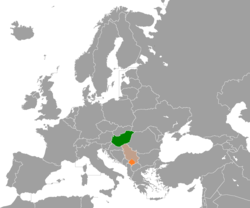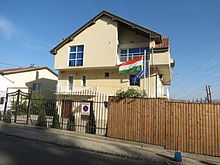| Revision as of 06:15, 14 August 2009 editRussavia (talk | contribs)78,741 edits Termer has seen fit to tag A&SO articles with POV - Kosovo articles also require it in this instance - need more views, particularly from Serbia/International community on this← Previous edit | Latest revision as of 18:34, 7 December 2024 edit undoAmela sadiki (talk | contribs)5 edits i added more informationsTag: Visual edit | ||
| (57 intermediate revisions by 43 users not shown) | |||
| Line 1: | Line 1: | ||
| {{Infobox bilateral relations|title=Hungarian–Kosovan|party1=Hungary|party2=Kosovo|mission1=Embassy of Hungary, Pristina|mission2=Embassy of Kosovo, Budapest|envoytitle1=Ambassador|envoytitle2=Ambassador|envoy1=József Bencze|envoy2=Shpend Kallaba}} | |||
| {{POV}} | |||
| ] | |||
| ⚫ | |||
| ''' |
The '''Hungary–Kosovo relations''' are foreign relations between ] and ]. ] ] from ] on 17 February 2008 and Hungary ] it on 19 March 2008.<ref>{{cite web|url=http://www.mfa.gov.hu/kum/en/bal/actualities/spokesman_statements/Kosovo_recognition_080319.htm |title=Hungary recognizes Kosovo's Independence |date=2008-03-19 |publisher=Ministry of Foreign Affairs of Hungary |access-date=2008-03-19 |url-status=dead |archive-url=https://web.archive.org/web/20080323041624/http://www.mfa.gov.hu/kum/en/bal/actualities/spokesman_statements/Kosovo_recognition_080319.htm |archive-date=March 23, 2008 }}</ref> Hungary has an embassy in ].<ref>{{cite web|url=http://www.mfa.gov.hu/kulkepviselet/Pristina/en/mainpage.htm |title=Embassy of the Republic of Hungary in Pristina |publisher=Hungarian Ministry of Foreign Affairs |access-date=2008-06-27 |url-status=dead |archive-url=https://web.archive.org/web/20080528213220/http://www.mfa.gov.hu/kulkepviselet/Pristina/en/mainpage.htm |archive-date=2008-05-28 }}</ref>'''Hungary''' was one of the first EU countries to officially recognize '''Kosovo’s''' independence after it declared independence from Serbia in 2008. Hungary recognized Kosovo’s sovereignty in 2008. This move positioned Hungary as one of the first EU countries to recognize Kosovo. In Hungary’s view Kosovo had the right to break away from Serbia after all of the tensions and establish itself as a sovereign nation. Hungary voted for Kosovo's entry into UNESCO, although the majority of members rejected Kosovo's request. Kosovo and Hungary have a close cooperation in the field of civil aviation and education, where for several years now, every year, scholarships have been awarded to students from Kosovo who study at Hungarian universities. Hungary, having been part of a region with its own history of national struggles, saw the recognition as a moral and diplomatic choice which was on Kosovo’s good and since then these two nations have good relations with one and other. This also mean that Hungary supports Kosovo in different ways, like Diplomatic Recognition, '''Advocacy in the EU''', Support for Visa Liberalization, and also economics. The reason that it supports is because of Principles of Self-Determination and also Geopolitical and Strategic Interests. However, Hungary’s recognition didn’t come without complications. While Hungary had a strong belief in Kosovo’s right to independence, it was also aware that Kosovo’s recognition was controversial, particularly in the context of EU politics. | ||
| == |
==History== | ||
| Despite Hungary's recognition of Kosovo's independence, ] ] stated in January 2023 that Hungary would vote against Kosovo's accession to European organizations until a deal was reached with Serbia. In April 2023, Hungary along with ], ], ], ], ], Serbia and ] voted against approving Kosovo's membership in the ].<ref name=":0">{{cite news|url=https://www.dailysabah.com/world/europe/serbia-to-alter-foreign-policy-after-eu-kosovo-decision-vucic|title=Serbia to alter foreign policy after EU Kosovo decision: Vucic|newspaper=]|date=2023-04-25|access-date=2023-04-28}}</ref><ref name=":1">{{cite news|url=https://www.euractiv.com/section/politics/news/serbia-disappointed-with-ukraine-greece-slovakia-over-coe-kosovo-vote/|title=Serbia ‘disappointed’ with Ukraine, Greece, Slovakia over CoE Kosovo vote|first=Tamara Milošević|last=Grbić|newspaper=]|date=2023-04-26|access-date=2023-04-28}}</ref> | |||
| == Kosovo's influence on the Hungarian-Serbian relations == | |||
| ⚫ | Hungary currently has 353 troops serving in Kosovo as peacekeepers in the ] |
||
| Hungary’s relationship with Serbia it is shaped by the issue of '''Kosovo’s independence'''. While Hungary has supported Kosovo's sovereignty since the beginning, Serbia didn’t, creating tension between the two countries. Despite this, Hungary has worked to maintain strong diplomatic and economic relations with Serbia, focusing on cooperation in areas like trade, energy, and security which both can benefit. Serbia, meanwhile, is also looking for EU membership, and Hungary plays a role in supporting Serbia's European integration. However, Hungary also recognizes that Kosovo’s issue must be resolved in some way for both Kosovo and Serbia to move forward in their EU aspirations. Kosovo plays a very big role in Serbia-Hungary relations, Hungary’s support for Kosovo does create diplomatic challenges with Serbia, but Hungary works to manage these differences.<ref name=":0" /><ref name=":1" /> | |||
| == Military == | |||
| ⚫ | Hungary currently has 353 troops serving in Kosovo as peacekeepers in the ]-led ].<ref> www.nato.int Link accessed 21-07-09</ref> | ||
| == From political cooperation towards economics == | |||
| As it is known, economic diplomacy is a driving force of relations between all of the states not only Hungary and Kosovo. Slowly but surely, the relations of Hungary and Kosovo started to pave the path in the economic direction, as well. One of the highest activities that marked an advancement of bilateral relations from a political dimension was the organization of the Economic Forum under the Prime Minister of Kosovo at the time, Hashim Thaci, as a part of Kosovo’s Government for investment promotion.The Economic Forum took place in Hungary- Budapest with the presence of the Hungarian Prime Minister at that time, Orbán Viktor. The key objective of this Forum was to promote investments in Kosovo and to boost economic and trade cooperation between Kosovo and Hungary. This event was one Kosovo’s benefits. | |||
| == See also == | == See also == | ||
| * ] | * ] | ||
| * ] | * ] | ||
| * ] | |||
| == |
==References== | ||
| {{reflist}} | {{reflist}} | ||
| Line 18: | Line 27: | ||
| {{Foreign relations of Kosovo}} | {{Foreign relations of Kosovo}} | ||
| {{DEFAULTSORT:Hungary-Kosovo relations}} | |||
| ⚫ | ] | ||
| ⚫ | ] | ||
| ⚫ | ] | ||
| {{foreignrelations-stub}} | |||
| ⚫ | {{Kosovo-stub}} | ||
| ⚫ | {{Hungary-stub}} | ||
| ⚫ | {{Kosovo-gov-stub}} | ||
| ⚫ | ] | ||
| ⚫ | {{Hungary-gov-stub}} | ||
| ⚫ | ] |
||
| {{Bilateralrelations-stub}} | |||
Latest revision as of 18:34, 7 December 2024
Bilateral relations | |
Hungary |
Kosovo |
|---|---|
| Diplomatic mission | |
| Embassy of Hungary, Pristina | Embassy of Kosovo, Budapest |
| Envoy | |
| Ambassador József Bencze | Ambassador Shpend Kallaba |

The Hungary–Kosovo relations are foreign relations between Hungary and Kosovo. Kosovo declared its independence from Serbia on 17 February 2008 and Hungary recognized it on 19 March 2008. Hungary has an embassy in Pristina.Hungary was one of the first EU countries to officially recognize Kosovo’s independence after it declared independence from Serbia in 2008. Hungary recognized Kosovo’s sovereignty in 2008. This move positioned Hungary as one of the first EU countries to recognize Kosovo. In Hungary’s view Kosovo had the right to break away from Serbia after all of the tensions and establish itself as a sovereign nation. Hungary voted for Kosovo's entry into UNESCO, although the majority of members rejected Kosovo's request. Kosovo and Hungary have a close cooperation in the field of civil aviation and education, where for several years now, every year, scholarships have been awarded to students from Kosovo who study at Hungarian universities. Hungary, having been part of a region with its own history of national struggles, saw the recognition as a moral and diplomatic choice which was on Kosovo’s good and since then these two nations have good relations with one and other. This also mean that Hungary supports Kosovo in different ways, like Diplomatic Recognition, Advocacy in the EU, Support for Visa Liberalization, and also economics. The reason that it supports is because of Principles of Self-Determination and also Geopolitical and Strategic Interests. However, Hungary’s recognition didn’t come without complications. While Hungary had a strong belief in Kosovo’s right to independence, it was also aware that Kosovo’s recognition was controversial, particularly in the context of EU politics.
History
Despite Hungary's recognition of Kosovo's independence, Minister of Foreign Affairs of Hungary Péter Szijjártó stated in January 2023 that Hungary would vote against Kosovo's accession to European organizations until a deal was reached with Serbia. In April 2023, Hungary along with Azerbaijan, Armenia, Cyprus, Georgia, Romania, Serbia and Spain voted against approving Kosovo's membership in the Council of Europe.
Kosovo's influence on the Hungarian-Serbian relations
Hungary’s relationship with Serbia it is shaped by the issue of Kosovo’s independence. While Hungary has supported Kosovo's sovereignty since the beginning, Serbia didn’t, creating tension between the two countries. Despite this, Hungary has worked to maintain strong diplomatic and economic relations with Serbia, focusing on cooperation in areas like trade, energy, and security which both can benefit. Serbia, meanwhile, is also looking for EU membership, and Hungary plays a role in supporting Serbia's European integration. However, Hungary also recognizes that Kosovo’s issue must be resolved in some way for both Kosovo and Serbia to move forward in their EU aspirations. Kosovo plays a very big role in Serbia-Hungary relations, Hungary’s support for Kosovo does create diplomatic challenges with Serbia, but Hungary works to manage these differences.
Military
Hungary currently has 353 troops serving in Kosovo as peacekeepers in the NATO-led Kosovo Force.
From political cooperation towards economics
As it is known, economic diplomacy is a driving force of relations between all of the states not only Hungary and Kosovo. Slowly but surely, the relations of Hungary and Kosovo started to pave the path in the economic direction, as well. One of the highest activities that marked an advancement of bilateral relations from a political dimension was the organization of the Economic Forum under the Prime Minister of Kosovo at the time, Hashim Thaci, as a part of Kosovo’s Government for investment promotion.The Economic Forum took place in Hungary- Budapest with the presence of the Hungarian Prime Minister at that time, Orbán Viktor. The key objective of this Forum was to promote investments in Kosovo and to boost economic and trade cooperation between Kosovo and Hungary. This event was one Kosovo’s benefits.
See also
References
- "Hungary recognizes Kosovo's Independence". Ministry of Foreign Affairs of Hungary. 2008-03-19. Archived from the original on March 23, 2008. Retrieved 2008-03-19.
- "Embassy of the Republic of Hungary in Pristina". Hungarian Ministry of Foreign Affairs. Archived from the original on 2008-05-28. Retrieved 2008-06-27.
- ^ "Serbia to alter foreign policy after EU Kosovo decision: Vucic". Daily Sabah. 2023-04-25. Retrieved 2023-04-28.
- ^ Grbić, Tamara Milošević (2023-04-26). "Serbia 'disappointed' with Ukraine, Greece, Slovakia over CoE Kosovo vote". Euractiv. Retrieved 2023-04-28.
- "Kosovo Force (KFOR)" www.nato.int Link accessed 21-07-09
| Africa |  | |
|---|---|---|
| Americas | ||
| Asia | ||
| Europe | ||
| Multilateral | ||
| Former | ||
| Diplomatic missions | ||
| |||||||||||||||||
| |||||||||||||||||
| |||||||||||||||||
This article about government in Kosovo is a stub. You can help Misplaced Pages by expanding it. |
This article about government in Hungary is a stub. You can help Misplaced Pages by expanding it. |
This article about bilateral relations is a stub. You can help Misplaced Pages by expanding it. |